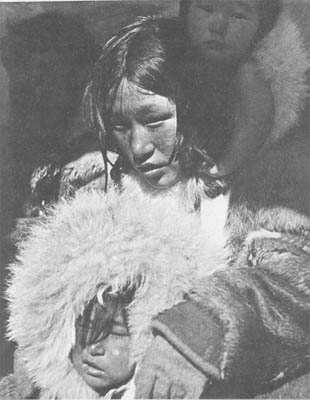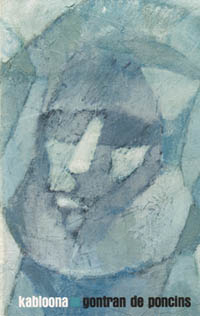“It came to me suddenly–
and this discovery preoccupied me entirely–
that here was unity,
here was the eternal and primitive family,
the family of the Bible:
father, mother, child, beasts of burden,
all composing one body with multiple heads.”
– Gontran De Poncin describing the Inuit Tribes people
 Inuit Woman with Children Photo by Gontran De Poncins |
The recent news of an isolated Amazon tribe photographed from the air pointing bows and arrows at the plane flying overhead, has inspired a great debate about the rights of such indigenous peoples who are threatened by illegal logging and development in their native lands. How will they react when exposed to civilization, as the Peruvian government seems helpless to prevent further encroachment into undeveloped lands?
 Kabloona Gontran De Poncins |
In 1938, Gontran De Poncins spent 15 months exploring the Canadian arctic, living with the Inuit (Eskimos), and studying their culture. He collected his experiences into a book published in 1941 titled Kabloona, which was the Inuit word for Europeans. His goal was to find an Inuit tribe that had never met a European before, which he succeeded in doing, but this was actually one of the least fascinating parts of his account.
Far more interesting was his observations of the invading European culture interacting with the Inuit, generating results keeping with the Law of Unintended Consequences. The Europeans thought the Inuit were dim-witted and amoral for sharing their wives and taking an aloof stance toward murder and theft, and the Inuit thought the Europeans were equally softheaded, foolishly giving away material goods and writing down everything because they had no memories.
Poncins describes a phenomenon where the Europeans began subjecting the Inuit to their laws, imprisoning those who murdered or stole. This kicked off a crime wave among the Inuit people, who were trying to get into the European prisons, where it was warm and there was free food.
Poncins started out sharing the European perspective that the Inuit were a lesser society, but came to appreciate their cultural innovations as adaptations to living in the Arctic climate. Their 20-hour-long feasts were not gluttony, but a way of storing up fat-energy to keep warm. Their practice of euthanizing older members of the tribe by setting them out on ice flows, was a survival necessity in an environment where anyone who cannot contribute to the community endangers the whole.
Both Europeans and Inuit peoples judged one another from the perspective of their own ignorance, with a numerous unintended results. Who would have thought, in our Information Age, that we would still be dealing with this same ignorance? Gontran De Poncins suspected he would be the last person on Earth to contact a previously untouched group of natives, with this discovery of an untouched tribe in the Amazon, and the certainty that there are others also within the mysterious jungles, we see that the Earth still has many surprises in store for us yet. There are lessons in Poncins’ historical account, if only that there are known unknowns when contacting an alien people.
Footnote: A Sunday-morning discussion on one of the morning news shows concerning the uncontacted Amazon tribe, covered the issue that even contacting these tribes would expose them to foreign illnesses for which their immune systems have no resistance. Similar to the way Native American exposure to smallpox by Europeans both intentional and unintentional wiped out entire civilizations, and the same way scientists and tourists working to save gorillas are exposing them to pathogens, which further endanger their existence.
Survival International takes up the cause of defending tribal peoples.
Comments
One response to “Gontran De Poncins’ Kabloona”